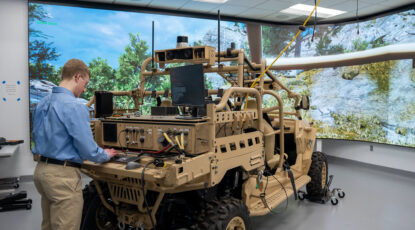Science and Technology
-
Off-road autonomy: U-M’s Automotive Research Center funded with $100 million through 2028
The U.S. Army has extended its long-running relationship with the U-M Automotive Research Center, reaching a new five-year agreement of up to $100 million to boost work on autonomous vehicle technologies. As automakers explore self-driving cars, the Army-funded center will figure out how to take the tech off-road.
-
These bubbles kill cancer
“Histotripsy” is a technique created by U-M engineers and doctors that harnesses soundwaves to attack cancer. It comes with the promise of few, if any side effects, a quick treatment time and, for patient Carrie Kumpel, the hope that it would completely destroy three spots that had formed on her liver.
-
Clinicians could be fooled by biased AI, despite explanations
A U-M study shows accurate AI models improved diagnostic decisions, but biased models led to serious declines. Researchers and policymakers are taking steps to ensure AI models are safe, secure, and trustworthy — and that their use would lead to improved outcomes.
-
A new generation of scientists
Kate Biberdorf, BS ’08, may be a chemistry professor at the University of Texas at Austin but aspiring scientists and fans know her as’ Kate the Chemist,’ an entertainer and bestselling author. She created the persona as a way of reaching new audiences and inspiring young minds to pursue STEM fields.
-
Neuroscientist Huda Akil wins National Medal of Science
The U-M neuroscientist is the eighth faculty member to receive the nation’s highest scientific honor. Her work contributes to the understanding of depression, anxiety, and addiction by delving into the genes, proteins, and cells that help govern human emotions and moods, and responses to pleasure and pain.
-
Hiss-toric first: U-M museum’s 70,000 snake specimens form world’s largest research collection
The U-M Museum of Zoology recently acquired tens of thousands of scientifically priceless reptile and amphibian specimens, including roughly 30,000 snakes preserved in alcohol-filled glass jars.
-
Tumor-destroying sound waves receive FDA approval for liver treatment in humans
Technique developed at U-M provides a noninvasive alternative to surgery, chemotherapy, and radiation treatments for cancer. A human trial underway since 2021 at the Rogel Cancer Center and other locations demonstrates the technology’s ability to meet the testing’s primary effectiveness and safety targets.
-
Are you there, AI? It’s me, God
As artificial intelligence apps such as ChatGPT have proliferated, so have chatbots with a religious bent. In this video and Q&A, Webb Keane, U-M professor of anthropology, shares his thoughts about so-called “godbots,” and the danger of giving moral authority to artificial intelligence.
-
Improvements in human genome databases offer a promising future for cancer research
A gene sequencing method called ribosome profiling has expanded our understanding of the human genome by identifying previously unknown protein coding regions. Also known as Ribo-seq, this method allows researchers to get a high-resolution snapshot of protein production in cells.










